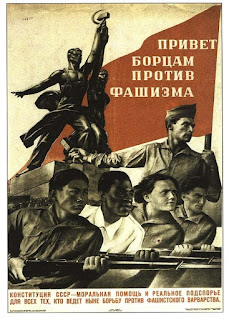Soviet Internationalism - The World Breaking from the Old World
The Soviet regime employed the use of propaganda to exercise
control on its citizens. However, another purpose these posters fulfill is the
representation of the ideas that were being spread around at the time.
Dada’s account serves as a great first hand account of a
brown man “breaking with the old world” who after enrolling in the University
of the Peoples of the East, did not just find an avenue of intellectual
opportunities but also saw a way out of the ways of the West and India. Here, Dada experienced a grant of freedom in
terms of intellect in the sense that their individualism, in terms of every
individual person that was enrolled, was commended and addressed as they were
all made to utilize their own languages in their intellectual discourse.
It was clear in Dada’s account was the relief of finding that
there was no exclusion of dark skinned people in any way that people of colour
had been encountering elsewhere. As exemplified in Dada’s account, the Soviets recognized
differences and celebrated them. People of all colours, women and people clad
in different clothing portrays the wide myriad of cultural and religious
backgrounds coming together, marching under the USSR flag.
This depicts the ability of the Soviets to amalgamate comrades under a single ideology that was a feat unachieved by many regimes elsewhere. However, it was not as if other nations or movements were planning to do so in quite the way Soviets attempted to do so. The Soviets idea was not about the domination of one culture over the other, instead was bringing together the dispersed ways of inhabiting the planet and bringing together different cultures under the similarity of differences.
Peace! Friendship!
The Soviet Internationalism wanted to do more than just
contest against wide spread imperialism but also to steer away from oppressive relations
embedded in the social fabric around the world.. The idea was to provide colonized
people with a home that was built on their conditions and provided a sense of
belonging while being their own selves.


Soviet comradery provided its people with a sense of belonging
that transcended their individual identities while anti-colonial and national
movements tended to achieve that by catering to one unified identity. In Dada’s
account, he felt a sense of inclusion when he arrived in Moscow when he was recognized
for his identity. He was given more recognition than he was at his own country.
It also gave them a sense of a belonging to their time in
the present world of the time. Colonised people in the pursuit of the White Man’s
civilizing mission were made to believe that they are underdeveloped and behind
whereas the Soviet internationalism gave them a sense of belief in their time
of now instead of being made to believe that they were still on their way and
had not yet achieved a stage of development. The Soviet promise was to be affirmed
of their existence which was so adamantly denied before.

Comments